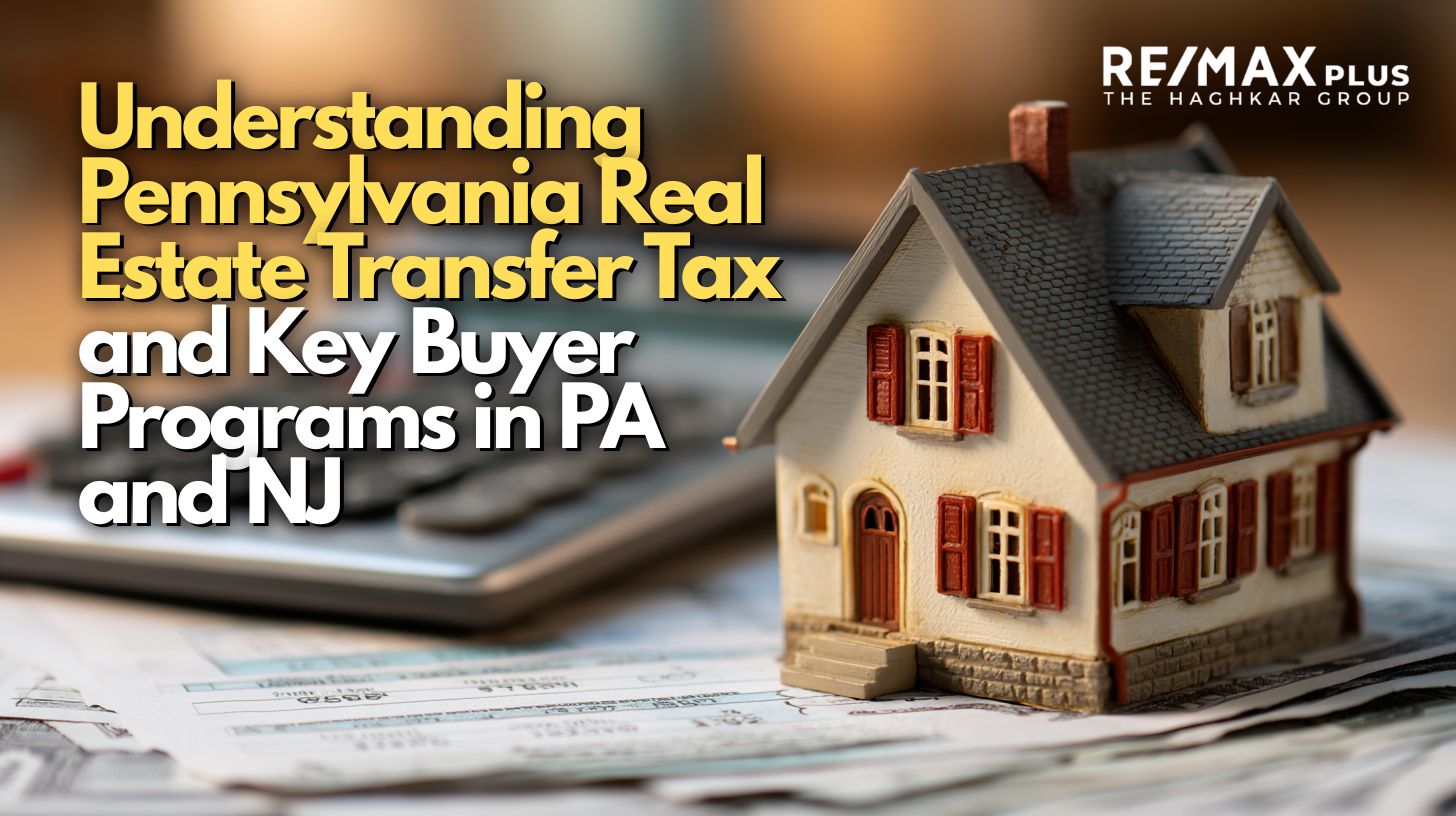
28 Jul Understanding PA Real Estate Transfer Tax & Key Buyer Programs in PA & NJ
Understanding State and Municipal Taxes & Buyer Programs in PA and NJ
Estimated reading time: 10 minutes
Key Takeaways
- The Pennsylvania real estate transfer tax significantly impacts transaction costs.
- First-time home buyer programs in PA and NJ can provide substantial financial assistance.
- Understanding differences between PA and NJ taxes is crucial for informed decision-making.
Table of Contents
- Navigating Real Estate Taxes and Buyer Programs
- Pennsylvania Real Estate Transfer Tax
- First-Time Home Buyer Grants in Pennsylvania
- Keystone Opportunity Zone
- New Jersey Mansion Tax
- New Jersey Homestead Rebate 2025
- Property Tax Relief Programs in New Jersey
- Comparative Analysis: PA vs. NJ Tax and Buyer Programs
- Impact of Taxes and Programs on Home Buyers
- Final Thoughts
Navigating Real Estate Taxes and Buyer Programs
Buying a home is a significant financial commitment, and understanding the state and municipal real estate taxes involved is crucial, especially in regions like Pennsylvania (PA) and New Jersey (NJ). These taxes can greatly affect both your transaction costs and long-term affordability. This comprehensive guide delves into key taxes such as the Pennsylvania real estate transfer tax, alongside comparing various buyer programs available in PA and NJ to help prospective homeowners and investors make informed decisions.
In This Blog, We’ll Cover:
- Pennsylvania real estate transfer tax
- First-time home buyer grants in PA
- Keystone Opportunity Zone
- NJ mansion tax
- NJ Homestead Rebate 2025
- Property tax relief programs in NJ
Awareness of these taxes and programs is vital for buyers. It not only leads to potential savings but also aids in making informed cross-state decisions between PA and NJ. Learn more.
Pennsylvania Real Estate Transfer Tax
The Pennsylvania real estate transfer tax applies to the sale price of a property when it is transferred. Understanding this tax’s intricacies can equip both buyers and sellers to negotiate and plan better.
What It Is and How It Works
The Pennsylvania real estate transfer tax is a combined state and local tax. Here’s how it breaks down:
- State Rate: 1%
- Local Municipalities and School Districts: Typically add another 1%
- Common Total Rate: 2% of the sale price
For more in-depth information, refer to this comprehensive guide: Pennsylvania Real Estate Transfer Taxes – An In-Depth Guide.
Variations by Location
1. Philadelphia:
- Total rate of approximately 4.278% (3.278% city + 1% state)
- Explore more on Philadelphia’s rates: Philadelphia Realty Transfer Tax
2. Allegheny County and Pittsburgh:
- Combined rates range from 2% to 5%
- Detailed info can be found here: Allegheny County Realty Transfer Taxes
Tax Responsibilities and Exemptions
- Payment Responsibilities: Typically split between buyer and seller but is negotiable.
- Learn more: Who Pays Transfer Taxes in Pennsylvania?
- Payment Timing: Due at the deed recording or within 30 days post-transfer.
- Exempt transactions like those between family members or inheritance can be exempt with correct documentation.
Understanding the impact of this tax on buyers and sellers is crucial, as it can significantly affect upfront costs and negotiation strategies.
First-Time Home Buyer Grants in Pennsylvania
For those entering the real estate market, first-time buyer grants can ease the financial burden.
Overview and Benefits
The first-time home buyer grants in PA provide significant financial assistance, mainly through programs offered by the Pennsylvania Housing Finance Agency (PHFA). These can help with:
- Down Payments
- Closing Costs
This alleviates the cash requirement at closing, making homeownership more accessible and manageable, especially when contending with the Pennsylvania real estate transfer tax. Learn more.
Who Qualifies and How to Apply
To be eligible, applicants generally must:
- Be first-time buyers (no homeownership in the previous 3 years)
- Meet income and property value limits
The application involves collaborating with an approved lender, completing a homebuyer education course, and furnishing all necessary documentation. Learn more.
Keystone Opportunity Zone
The Keystone Opportunity Zone (KOZ) serves as an economic catalyst, allowing property owners and businesses within designated areas to enjoy substantial tax perks.
Definition and Benefits
KOZs offer:
- Exemptions from various state and local taxes, including real estate taxes
- Up to 100% tax abatements for a specific time frame
These incentives are designed to spark redevelopment and drive economic growth in underutilized areas. Further details can be found here: Pennsylvania Department of Community & Economic Development.
New Jersey Mansion Tax
For those considering luxury properties, the NJ mansion tax represents an important financial consideration.
Understanding the Tax
The mansion tax is levied at 1% on properties sold for $1 million or more. This tax uniquely targets high-value real estate transactions to generate revenue.
Comparison
While this tax impacts fewer transactions than the Pennsylvania real estate transfer tax, it reflects a strategic revenue approach aimed at luxury market participants. More information is available here: NJ Division of Taxation – Realty Transfer Fee.
New Jersey Homestead Rebate 2025
Property tax relief is a pivotal factor in NJ real estate transactions. The NJ Homestead Rebate 2025 helps reduce annual property tax burdens for eligible homeowners.
Eligibility and Benefits
Eligibility is often determined by:
- Income thresholds
- The property being a primary residence
- Age and disability status
Rebates directly lower tax bills, offering savings that can be substantial, especially for those on fixed incomes. For further information, visit: NJ Division of Taxation – Homestead Benefit.
Property Tax Relief Programs in New Jersey
NJ is committed to reducing the property tax load through various programs aimed at assisting distinct demographic groups.
Key Programs
1. Senior Freeze (Property Tax Reimbursement)
- Designed for seniors and the disabled to offset tax increases.
- Eligibility specifics include age and income limits.
2. Veterans Property Tax Deduction
- Offers a $250 deduction annually for qualifying veterans.
3. ANCHOR Program (potential replacer of existing initiatives)
- Provides rebates for homeowners and renters based on income criteria.
Understanding and applying to these programs can lead to substantial financial benefits. Detailed program criteria can be accessed at Property Tax Relief Programs in New Jersey.
Comparative Analysis: PA vs. NJ Tax and Buyer Programs
Real Estate Transfer Taxes
| Aspect | Pennsylvania | New Jersey |
|---|---|---|
| Transfer Tax Rate | Typically 2% | 1% Mansion Tax on properties over $1 million |
| Applies To | Most property transactions | Properties $1 million and above |
| Negotiable Payment | Yes, split between buyer and seller | Often the buyer pays |
Buyer Assistance Programs
Pennsylvania offers first-time home buyer grants and tax benefits via Keystone Opportunity Zones, making the state appealing to new buyers and investors. Meanwhile, New Jersey provides robust property tax relief programs that cater to broadly varied demographics.
Choosing Between States
- Upfront Costs: PA typically incurs more substantial upfront costs due to transfer taxes. NJ taxes are generally less significant unless dealing with high-end properties.
- Long-Term Affordability: NJ’s higher property taxes are often mitigated by extensive relief programs, whereas PA offers fewer statewide relief programs, but KOZs can offer unique opportunities.
Impact of Taxes and Programs on Home Buyers
Understanding and leveraging these financial levers, such as transfer taxes and buyer grants, can make purchasing a home in either state more affordable and financially wise. Consulting professional guidance from qualified real estate agents and tax advisors ensures buyers can optimize potential savings and stay compliant with state-specific obligations.
Final Thoughts
Whether you’re buying in Pennsylvania or New Jersey, understanding state and municipal taxes, alongside available buyer programs, is key to navigating the real estate waters wisely. By researching thoroughly and seeking professional advice, buyers can sidestep financial pitfalls and unlock monetary benefits to enhance their home-buying journey.
Need More Help?
Buying a home is complex, with taxes and programs adding layers of consideration. Whether you’re eyeing Pennsylvania’s Keystone Zones or exploring tax relief in New Jersey, connecting with an expert can offer invaluable insights tailored to your situation. Reach out to a real estate expert at RE/MAX Plus today to explore your options and make your next home purchase with confidence.
For more on saving money as a homeowner, visit Ways You Can Save Money as a Homeowner.
For a comprehensive understanding of homebuyer benefits, check out Homebuyer Tax Benefits & How to Use Them.
To explore additional property tax relief options, visit Property Tax Relief Programs in New Jersey.
For detailed information on the NJ Homestead Rebate 2025, refer to NJ Homestead Rebate 2025.

